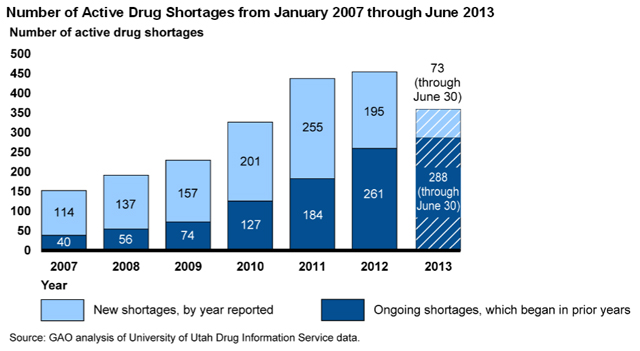GAO’s Health Care Team
- Military and Veterans’ Health Care
- Public Health
- Private Insurance
- Medicare
- Medicaid

Excerpted from GAO-14-194
The immediate cause of these new and ongoing drug shortages can generally be traced to a manufacturer who halts or slows production to address quality problems, leading to a supply disruption that other manufacturers don’t have the capacity to offset. In addition, low profit margins for certain drugs have limited manufacturers’ infrastructure investments or led some to exit the market entirely. The Food and Drug Administration (FDA) is responsible for addressing prescription drug shortages. Although shortages have persisted, the agency has improved its responsiveness and prevented more potential shortages in the last 2 years. However, shortcomings in FDA’s management of drug shortage data could undermine its efforts. We recommended that the agency strengthen its internal controls over its drug shortage data and periodically assess the information to proactively identify drug shortage risk factors. Listen to a podcast and watch the Ask GAO Live chat we recorded with the director of this work:- Questions on the content of this post? Contact Cindy Bascetta at bascettac@gao.gov.
- Comments on GAO’s WatchBlog? Contact blog@gao.gov.

GAO's mission is to provide Congress with fact-based, nonpartisan information that can help improve federal government performance and ensure accountability for the benefit of the American people. GAO launched its WatchBlog in January, 2014, as part of its continuing effort to reach its audiences—Congress and the American people—where they are currently looking for information.
The blog format allows GAO to provide a little more context about its work than it can offer on its other social media platforms. Posts will tie GAO work to current events and the news; show how GAO’s work is affecting agencies or legislation; highlight reports, testimonies, and issue areas where GAO does work; and provide information about GAO itself, among other things.
Please send any feedback on GAO's WatchBlog to blog@gao.gov.
